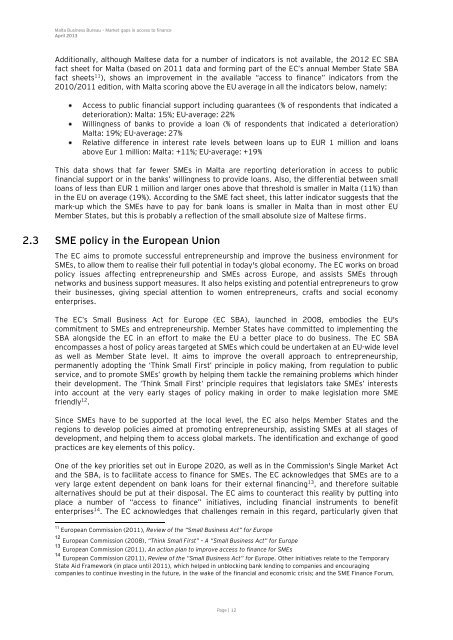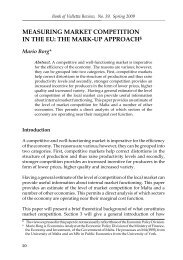Market Gaps on Access to Finance - Bank of Valletta
Market Gaps on Access to Finance - Bank of Valletta
Market Gaps on Access to Finance - Bank of Valletta
Create successful ePaper yourself
Turn your PDF publications into a flip-book with our unique Google optimized e-Paper software.
Malta Business Bureau – <str<strong>on</strong>g>Market</str<strong>on</strong>g> gaps in access <strong>to</strong> finance<br />
April 2013<br />
Additi<strong>on</strong>ally, although Maltese data for a number <strong>of</strong> indica<strong>to</strong>rs is not available, the 2012 EC SBA<br />
fact sheet for Malta (based <strong>on</strong> 2011 data and forming part <strong>of</strong> the EC’s annual Member State SBA<br />
fact sheets 11 ), shows an improvement in the available “access <strong>to</strong> finance” indica<strong>to</strong>rs from the<br />
2010/2011 editi<strong>on</strong>, with Malta scoring above the EU average in all the indica<strong>to</strong>rs below, namely:<br />
<strong>Access</strong> <strong>to</strong> public financial support including guarantees (% <strong>of</strong> resp<strong>on</strong>dents that indicated a<br />
deteriorati<strong>on</strong>): Malta: 15%; EU-average: 22%<br />
Willingness <strong>of</strong> banks <strong>to</strong> provide a loan (% <strong>of</strong> resp<strong>on</strong>dents that indicated a deteriorati<strong>on</strong>)<br />
Malta: 19%; EU-average: 27%<br />
Relative difference in interest rate levels between loans up <strong>to</strong> EUR 1 milli<strong>on</strong> and loans<br />
above Eur 1 milli<strong>on</strong>: Malta: +11%; EU-average: +19%<br />
This data shows that far fewer SMEs in Malta are reporting deteriorati<strong>on</strong> in access <strong>to</strong> public<br />
financial support or in the banks’ willingness <strong>to</strong> provide loans. Also, the differential between small<br />
loans <strong>of</strong> less than EUR 1 milli<strong>on</strong> and larger <strong>on</strong>es above that threshold is smaller in Malta (11%) than<br />
in the EU <strong>on</strong> average (19%). According <strong>to</strong> the SME fact sheet, this latter indica<strong>to</strong>r suggests that the<br />
mark-up which the SMEs have <strong>to</strong> pay for bank loans is smaller in Malta than in most other EU<br />
Member States, but this is probably a reflecti<strong>on</strong> <strong>of</strong> the small absolute size <strong>of</strong> Maltese firms.<br />
2.3 SME policy in the European Uni<strong>on</strong><br />
The EC aims <strong>to</strong> promote successful entrepreneurship and improve the business envir<strong>on</strong>ment for<br />
SMEs, <strong>to</strong> allow them <strong>to</strong> realise their full potential in <strong>to</strong>day's global ec<strong>on</strong>omy. The EC works <strong>on</strong> broad<br />
policy issues affecting entrepreneurship and SMEs across Europe, and assists SMEs through<br />
networks and business support measures. It also helps existing and potential entrepreneurs <strong>to</strong> grow<br />
their businesses, giving special attenti<strong>on</strong> <strong>to</strong> women entrepreneurs, crafts and social ec<strong>on</strong>omy<br />
enterprises.<br />
The EC’s Small Business Act for Europe (EC SBA), launched in 2008, embodies the EU's<br />
commitment <strong>to</strong> SMEs and entrepreneurship. Member States have committed <strong>to</strong> implementing the<br />
SBA al<strong>on</strong>gside the EC in an effort <strong>to</strong> make the EU a better place <strong>to</strong> do business. The EC SBA<br />
encompasses a host <strong>of</strong> policy areas targeted at SMEs which could be undertaken at an EU-wide level<br />
as well as Member State level. It aims <strong>to</strong> improve the overall approach <strong>to</strong> entrepreneurship,<br />
permanently adopting the ‘Think Small First’ principle in policy making, from regulati<strong>on</strong> <strong>to</strong> public<br />
service, and <strong>to</strong> promote SMEs’ growth by helping them tackle the remaining problems which hinder<br />
their development. The ‘Think Small First’ principle requires that legisla<strong>to</strong>rs take SMEs’ interests<br />
in<strong>to</strong> account at the very early stages <strong>of</strong> policy making in order <strong>to</strong> make legislati<strong>on</strong> more SME<br />
friendly 12 .<br />
Since SMEs have <strong>to</strong> be supported at the local level, the EC also helps Member States and the<br />
regi<strong>on</strong>s <strong>to</strong> develop policies aimed at promoting entrepreneurship, assisting SMEs at all stages <strong>of</strong><br />
development, and helping them <strong>to</strong> access global markets. The identificati<strong>on</strong> and exchange <strong>of</strong> good<br />
practices are key elements <strong>of</strong> this policy.<br />
One <strong>of</strong> the key priorities set out in Europe 2020, as well as in the Commissi<strong>on</strong>'s Single <str<strong>on</strong>g>Market</str<strong>on</strong>g> Act<br />
and the SBA, is <strong>to</strong> facilitate access <strong>to</strong> finance for SMEs. The EC acknowledges that SMEs are <strong>to</strong> a<br />
very large extent dependent <strong>on</strong> bank loans for their external financing 13 , and therefore suitable<br />
alternatives should be put at their disposal. The EC aims <strong>to</strong> counteract this reality by putting in<strong>to</strong><br />
place a number <strong>of</strong> “access <strong>to</strong> finance” initiatives, including financial instruments <strong>to</strong> benefit<br />
enterprises 14 . The EC acknowledges that challenges remain in this regard, particularly given that<br />
11 European Commissi<strong>on</strong> (2011), Review <strong>of</strong> the “Small Business Act” for Europe<br />
12<br />
European Commissi<strong>on</strong> (2008), “Think Small First” – A “Small Business Act” for Europe<br />
13<br />
European Commissi<strong>on</strong> (2011), An acti<strong>on</strong> plan <strong>to</strong> improve access <strong>to</strong> finance for SMEs<br />
14<br />
European Commissi<strong>on</strong> (2011), Review <strong>of</strong> the “Small Business Act” for Europe. Other initiatives relate <strong>to</strong> the Temporary<br />
State Aid Framework (in place until 2011), which helped in unblocking bank lending <strong>to</strong> companies and encouraging<br />
companies <strong>to</strong> c<strong>on</strong>tinue investing in the future, in the wake <strong>of</strong> the financial and ec<strong>on</strong>omic crisis; and the SME <strong>Finance</strong> Forum,<br />
Page | 12







